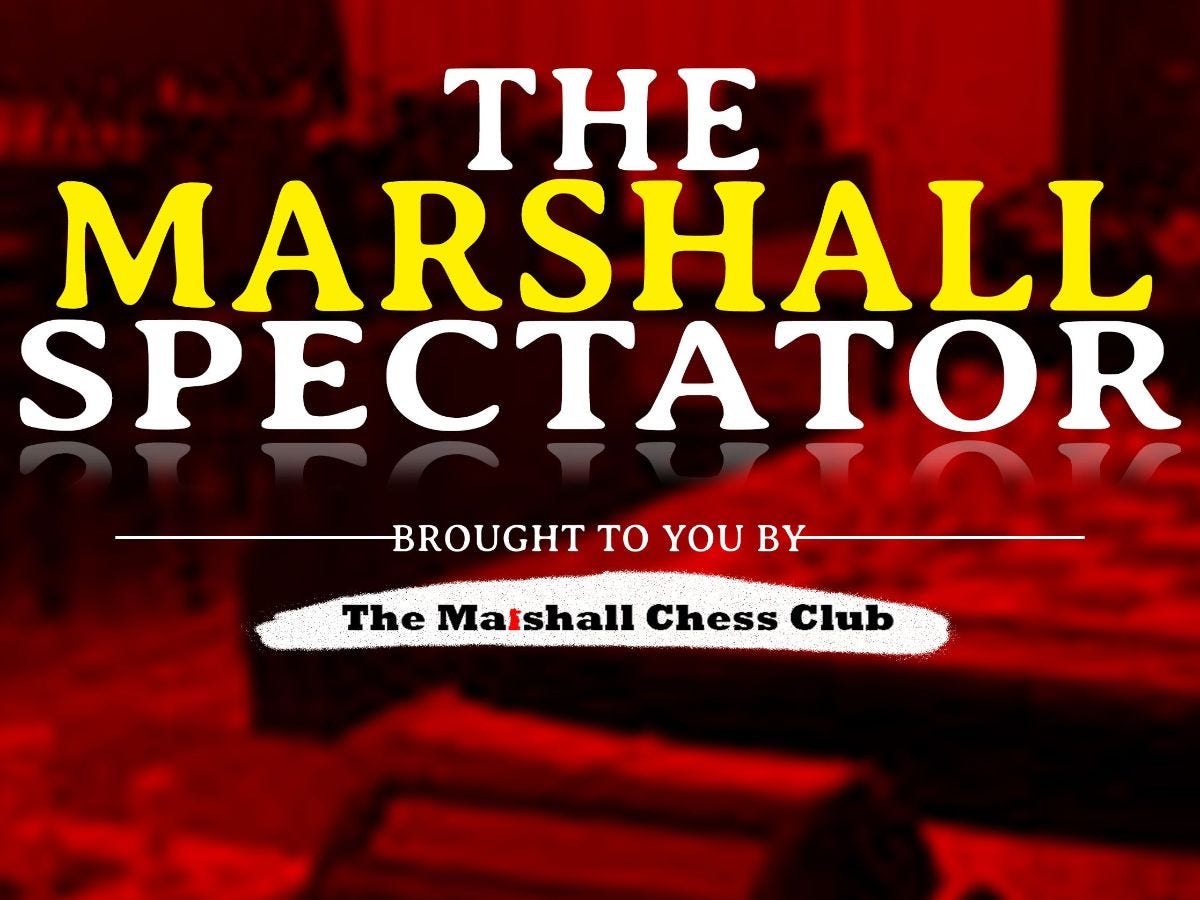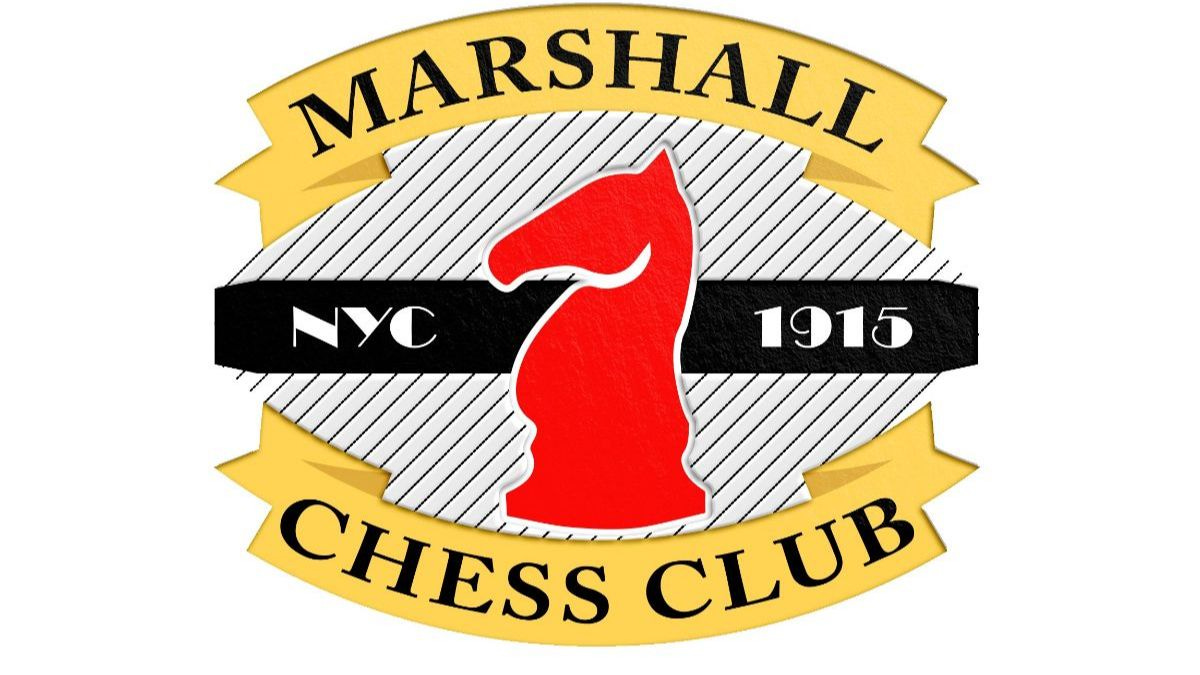Marshall Spectator 07.14.2021

Contents 07.14.2021:
Buzzing the Door
Beginner's Corner
Sunday Sunday Sunday
En Passant
Problem of the Week
(Editor's Note)
Buzzing the Door
Twelve years ago I buzzed the door at Twenty-Three West Tenth Street for the first time and waited nervously for someone to let me in. I buzzed again after a minute because no one answered. This was pretty standard back then; the only way for the staff to open the door was to pick up a white phone receiver in the office and press a button—a difficult thing to do, I now know, since the person on duty might be monitoring a tournament game or showing a tourist around.
A LOT has changed since then. We have more FIDE rated events now. There's the (amazing!) addition of an extra bathroom. Registration occurs almost exclusively online thanks to our modernized website. And members who were just children then are now Samford Fellows and elite Grandmasters playing in European Invitationals. Yet, from a staff perspective at least, the single greatest change over these years might be the introduction of wireless door buzzers: pocket size, single-button clickers that remotely click the door open from anywhere inside the club.
Unless you've worked at the club, you wouldn't understand the enormous impact of these devices. Picture this: two players on board one. It's the final round of the tournament. A crowd has gathered. There is time pressure. A big money prize is on the line (not to mention the rating points!). You are the TD on duty and your eyes need to be glued to that board, as they should be. But in the background there is a recurring: BEEP! BEEP! BEEP! Someone who went outside wants to reenter the club. They are waiting outside and are impatient because, well, people are impatient.
What would you do in that situation? Run into the office and let the person in, taking your eyes off the critical game in the process? Continue watching the game while the BEEP! reoccurs with greater frequency and more heads turned to you to stop the infernal noise? There was no good answer for a TD. And this was a regular and impossible situation for our staff—especially during rapid and blitz events—before the remote buzzer was introduced.
It's remarkable the difference small changes can make, changes that many people might not ever realize or notice. But these little devices significantly improved the tournament experience for players in the subtlest of ways. They've also enabled the Club staff to do our jobs more effectively. I don't know what other innovations lie around the corner. . .but if someone were to replace those obnoxiously loud hand-dryers in the bathrooms, the tournament halls might actually be quiet.
—Greg Keener, FIDE Arbiter

Beginner's Corner
What are "U1400?," "4-SS," & "G/25 d5?"
For beginners, reading tournament listings can be confusing. There are a lot of abbreviations the meaning of which might not be very clear. If you go to the top of the Club's tournament registration page, you can find a detailed description of these abbreviations by clicking, "How to read tournament listings." Below I'll lay out some of the basics.
When you see "U" followed by a number in an event title (such as "U1400") that means the event has a section for players only with USCF ratings under (hence "u) that number. Next, you'll often see "4-SS" or "5-SS." This means the event is played as a four round or five round Swiss-system tournament. The key thing about Swiss-system events is that there are no eliminations; all players play all games. After the first round, the winners are paired against each other and the same is typically true for those who drew and those who lost. The goal being that players face opponents who have similar scores throughout the tournament. The other critical abbreviation is the time control, which often appears as "G/25 d5" or "G/90 +30"; the two most common time controls the Club uses these days. "G/25" means that each player has 25 minutes on their clock to play the game, with an added delay of 5 seconds ("d5") per turn. In other words, their time will not continue running down for the first five seconds of their move. ("+30" means that players' gain a bonus of 30 seconds on their clock each move. It is known as an increment.)
And one more quick tip for all of our new members: Sometimes, when I see beginners playing blitz, they make a move with one hand and hit the clock with their other hand. This is very fast and efficient, but alas, it is not legal in tournament chess. You have to hit the clock with the same hand you used to move your piece. Likewise, it is illegal to touch your piece to move it before your opponent has hit the clock to finish their move. Disputes sometimes arise in time pressure situations when players try to do this to gain an edge. You might be able to make "pre-moves" online but you can't do that over-the-board!
Remember to follow these rules and, when in doubt (as always) ask the tournament director for help!
—Ken Kubo, MCC Board of Governors
Sunday Sunday Sunday
Slowly but surely we are marching toward a complete Club reopening. Soon enough the Club will once again resemble (more or less) what it was prior to the pandemic. The next step in that process is the full reopening of the Club on weekends and so—effective this week—the club will once again be open every weekend day!
If you can't make it to the Club for the U1400 Morning or the G/50 Open this Saturday (or, what the heck, you had so much fun playing chess on Saturday you just can't stay away) then join us on Sunday, July 18th for our G/50 Open & U1600 reprise.
For the time being, our ever popular (Sunday) Rated Beginner Open will remain in the online arena to accommodate the young people who cannot yet get vaccinated. But stay tuned to our Calendar and The Spectator as our schedule is constantly evolving alongside our COVID protocols.
En Passant
Chess News En Passant:
—Maxim Vachier-Lagrave (MVL) won the third leg of the Grand Chess Tour in Croatia with a round to spare. MVL will look to secure a spot in the next Candidates Tournament by reaching the finals at the 2021 Chess World Cup, which got underway earlier this week. And speaking of Croatia. . .
—Former World Champion (and, arguably, the Chess G.O.A.T.) Garry Kasparov played some blitz and ahhhh. . . it did not go so well for him.
—At twelve years four months and twenty-five days, Abhimanyu Mishra, of New Jersey, has become the youngest GM in chess history. He broke the record previously set by Sergey Karjakin, who was approximately two months older when he earned the GM title. Mishra memorably played in the Club's IM Norm RR in 2019 but the competition proved too stiff to earn a norm.
—Interested in the Bogo-Indian? (Who doesn't love the 4. . . c5 line with doubled pawns for black!?) Sam Shankland's play has inspired some new ideas in the "Bogo," particularly focused on 5. e3.
Problem of the Week
Niels Høeg, 1916

3 + 1
What was the last move?
OK, it’s that moment all you OTBers have been dreading: we’re going to move beyond studies for a while and turn to the wonderful world of chess problems! Buckle up!! We’ll start with some problems in retroanalysis, which requires that you use your knowledge of the rules of chess and your powers of reasoning to deduce how a particular position could have been reached. This week’s problem is a gem: so little material and yet so cunningly arranged to force just one particular immediate history.
[Solution to Mandler, 1964: 1.Ba8 Kf4 2.Bc6 Kg4 3.Bxb5. If 2...Bf7 3.Bxb5 Bh5 4.Bd7. There are other interesting lines as well for you to work out on your own.]
—Alexander George
Editor's Note
This is the final edition of The Spectator I'm editing. I hope you've enjoyed these first twenty-one issues. Going forward, I leave you in the very capable hands of Gregory Keener, who promises to bring his own flair and style to our humble fortnightly. Enjoy, and thanks for reading!
—Bryan Quick, (out-going) MCC Executive Director
The Marshall Chess Club
Address: 23 West Tenth Street New York NY 10011
Contact: 212.477.3716; td@marshallchessclub.org
Hours: M-F 1pm-Midnight; S/Su 9am-Midnight





